
Section 498A of the Indian Penal Code encompasses the legal provision for giving punishment of imprisonment upto 3 years to a husband of a woman or relative of the husband of a woman who subjects such woman to cruelty. The law which was primarily made to safeguard a woman’s right and dignity is often seen to be used as a weapon against innocent husbands and in-laws by their wives and daughters in law in order to harass them and extract monies.
In recent times it is seen that false and frivolous case of cruelty and domestic violence by wives upon their husbands and in-laws is on a rise. False cases u/s 498A IPC are amongst such example of harassment on part of such wives.
WHAT IS THE REMEDY AVAILABLE?
When an FIR gets lodged , it got to reach at its logical conclusion through the different stages of legal actions on the part of the police , and proceedings before the Court, such as investigation, arrests, bails, trial, conviction, acquittal, sentencing/ imprisonment/ fine. The Case being a State Case, the parties, i.e. the Complainant and the Accused do not have much control over it, except that they can move the higher Courts and/ or the Court concerned if they feel aggrieved with continuance/ proceeding of the aforementioned stages.
However the Code of Criminal Procedure provides for a way to escape the aforementioned stages by coming to a settlement and getting the FIR compounded u/s 320 CrPC. However not all offences can be compounded and therefore a person can who has either settled the matter amicably or believes that there exists no prima facie case against him can approach the High Court for quashing of FIR and thereby putting an end to the whole trial. But the discretion to quash an FIR is to be exercised by the courts.
IS SECTION 498A COMPOUNDABLE or NON-COMPOUNDABLE?
Section 320 of the CrPC tells which offences can be compounded and how. Section 498A IPC has not been made a compoundable offence u/s 320 CrPC thereby making it a non-compoundable offence.
Does It Mean That In a Trial u/s 498A If Wife and Husband
Have Settled Their Case Amicably Will They Still Have to Undergo Trial?
498A though not a
compoundable offence can still be settled amicably between the parties and the
FIR can be quashed by presenting a quashing petition before the High Court. The
courts have been liberal in quashing trials arising out of matrimonial disputes
since matrimonial setup plays an important role in the society and efforts are
made by courts to settle disputes between them. However this is not the status
quo in all cases and courts may refuse to quash the petition even after the
matter is settled between the parties depending on the facts and circumstances
of each case.
The Hon’ble Supreme Court in Jitendra Raghuvanshi & Ors. Vs. Babita Raghuvanshi & Anr. (2013) 4 SCC 58 held that “In our view, it is the duty of the courts to encourage genuine settlements of matrimonial disputes , particularly , when the same are on considerable increase. Even if the offences are noncompoundable , if they relate to matrimonial disputes and the Court is satisfied that the parties have settled the same amicably and without any pressure, we hold that for the purpose of securing ends of justice, Section 320 of the Code would not be a bar to the exercise of power of quashing of FIR, complaint or the subsequent criminal proceedings. There has been an outburst of matrimonial disputes in recent times. They institution of marriage occupies an important place and it has an important role to play in the society. Therefore, every effort should be made in the interest of the individuals in order to enable them to settle down in life and live peacefully. If the parties ponder over their defaults and terminate their disputes amicably by mutual agreement instead of fighting it out in a court of law, in order to do complete justice in the matrimonial matters, the courts should be less hesitant in exercising their extraordinary jurisdiction. It is trite to state that the power under Section 482 should be exercised sparingly and with circumspection only when the Court is convinced, on the basis of material”
HOW TO QUASH FIR U/S 498A IPC?
1. When Parties Have Arrived At a Settlement
If the complainant and the accused in a 498A case have settled their disputes through counseling, mediation etc, accused can move a quashing petition before the High Court to quash the FIR and its subsequent proceedings. The courts are quite liberal in giving reliefs in such cases where the parties have settled their disputes and in most of the cases quash the FIR u/s 498A and its subsequent proceedings. The courts may in rare circumstances impose costs on the complainant while quashing the FIR.
In the case of Parbatbhai Aahir & Ors. Vs State of Gujarat & Ors (2017) SC the Supreme Court of India has summarized the principles that need to be kept in mind by the High Courts while considering a plea for quashing an FIR/ Criminal Proceedings under Section 482 of the Code of Criminal Procedure on the ground of settlement between parties. It laid down the following principles:
(i) Section 482 preserves the inherent powers of the High Court to prevent an abuse of the process of any court or to secure the ends of justice. The provision does not confer new powers. It only recognizes and preserves powers which inhere in the High Court;
(ii) The invocation of the jurisdiction of the High Court to quash a First Information Report or a criminal proceeding on the ground that a settlement has been arrived at between the offender and the victim is not the same as the invocation of jurisdiction for the purpose of compounding an offence. While compounding an offence, the power of the court is governed by the provisions of Section 320 of the Code of Criminal Procedure, 1973. The power to quash under Section 482 is attracted even if the offence is non-compoundable.
(iii) In forming an opinion whether a criminal proceeding or complaint should be quashed in exercise of its jurisdiction under Section 482, the High Court must evaluate whether the ends of justice would justify the exercise of the inherent power;
(iv) While the inherent power of the High Court has a wide ambit and plenitude it has to be exercised; (i) to secure the ends of justice or (ii) to prevent an abuse of the process of any court;
(v) The decision as to whether a complaint or First Information Report should be quashed on the ground that the offender and victim have settled the dispute, revolves ultimately on the facts and circumstances of each case and no exhaustive elaboration of principles can be formulated;
(vi) In the exercise of the power under Section 482 and while dealing with a plea that the dispute has been settled, the High Court must have due regard to the nature and gravity of the offence. Heinous and serious offences involving mental depravity or offences such as murder, rape and dacoity cannot appropriately be quashed though the victim or the family of the victim have settled the dispute. Such offences are, truly speaking, not private in nature but have a serious impact upon society. The decision to continue with the trial in such cases is founded on the overriding element of public interest in punishing persons for serious offences;
(vii) As distinguished from serious offences, there may be criminal cases which have an overwhelming or predominant element of a civil dispute. They stand on a distinct footing in so far as the exercise of the inherent power to quash is concerned;
(viii) Criminal cases involving offences which arise from commercial, financial, mercantile, partnership or similar transactions with an essentially civil flavor may in appropriate situations fall for quashing where parties have settled the dispute;
(ix) In such a case, the High Court may quash the criminal proceeding if in view of the compromise between the disputants, the possibility of a 17 conviction is remote and the continuation of a criminal proceeding would cause oppression and prejudice; and
(x) There is yet an exception to the principle set out in propositions (viii) and (ix) above. Economic offences involving the financial and economic well-being of the state have implications which lie beyond the domain of a mere dispute between private disputants. The High Court would be justified in declining to quash where the offender is involved in an activity akin to a financial or economic fraud or misdemeanor. The consequences of the act complained of upon the financial or economic system will weigh in the balance.”
Things required to be produced before the court while presenting a quashing petition wherein parties have arrived at a settlement:
a) True Copy of the FIR.
b) True Copy of the Charge sheet. (If any)
c) True Copy of the Settlement Agreement. (if written agreement exists)
d) Affidavits of the all the accused supporting the petition.
e) Affidavit of the complainant stating that the matter has been settled between her and all the accused and that she has no objection if the court quashes the FIR.
f) Identity proofs of the accused and the complainant.
2. When No Settlement is Arrived Between the Parties
At times a situation might arise wherein the parties are not able to come to a common understanding and the settlement is not possible. In such a case the accused can either contest the case or where there exist no prima facie case against the accused he can file a quashing petition before the High Court to quash the FIR and its subsequent proceedings. However in such type of quashing where no settlement is arrived between the parties, courts are very stringent and the onus on the accused is very strict to prove that no case is established against him. Person in such a case may prove that there is no concrete evidence against the accused, or there is no proximity between the accused and the victim so that an offence can take place.
In the following two landmark judgments the supreme Court of India has laid down certain circumstances wherein the High Court can quash the FIR and Criminal Proceedings against the accused:
In R. P. Kapur Vs. State Of Punjab 1960 AIR 862 it was held that “the inherent Jurisdiction of the High Court could be exercised to quash proceedings in a proper case either to prevent the abuse of the process of any Court or otherwise to secure the ends of justice. The following are some categories of cases where the inherent jurisdiction could and should be exercised to quash proceedings:-
(i) where it manifestly appears that there was a legal bar against the institution or continuance of the proceedings;
(ii) where the allegations in the first information report or complaint taken at their face value and accepted in their entirety do not constitute or do not make out the offence alleged; and
(iii) where either there was no legal evidence adduced in support of the charge or the evidence adduced clearly or manifestly failed to prove the charge.”
In State of Haryana v. Bhajan Lal 1992 AIR 604, the Supreme Court had laid down following seven categories of cases in which the court can quash criminal proceedings:
1. Where the allegations made in the FIR, even if taken at face value and accepted in their entirety, do not prima facie constitute any offence or make out a case against the accused.
2. Where the allegations in the FIR and other materials, if any, accompanying the FIR do not disclose a cognizable offence, justifying an investigation by police officers under Section 156(1)of the Code except under an order of a Magistrate within the purview of Section 155(2) of the Code.
3. Where the allegations made in the FIR and the evidence collected in support of the same do not disclose the commission of any offence and make out a case against the accused.
4. Where the allegations in the FIR do not constitute a cognizable offence but constitute only a non-cognizable offence, no investigation is permitted by a police officer, unless a Magistrate has issued an order for the same, as contemplated under Section 155(2)of the Code.
5. Where the allegations made in the FIR are absurd to the extent that no prudent man can ever reach a just conclusion that there is sufficient ground for proceeding against the accused.
6. Where there is an express legal bar engrafted in any of the provisions of the Code or the concerned Act, under which a criminal proceeding is instituted, with regard to the institution and continuance of the proceedings and / or where there is a specific provision in the Code or the concerned Act, providing efficacious redress for the grievance of the aggrieved party.
7. Where a criminal proceeding is manifestly attended with mala de intention and/or where the proceeding is maliciously instituted with an ulterior motive for wreaking vengeance on the accused and with a view to spite him due to private and / or personal grudge
If the above mentioned points are satisfied the accused can very easily get the FIR and subsequent proceedings quashed.
Most of the times women tend to drag the relatives of the husband into their complaints and prosecute them in false cases for the simple reason to harass and pressurize their husbands to agree to their demands. Courts have acted very pro-actively in such cases and have quashed the FIR/ proceedings against such relatives where no specific allegations have been asserted or proved against them.
In Natubahi Somabhai Rohit & others vs. State of Gujarat (2017) Guj. HC the High Court of Gujarat while quashing the FIR against relatives of the husband observed that the tendency to rope in all the family members in the FIR speaks for themselves and in such circumstances , the requirements of alleging specific role for each of the members becomes necessary, for which the indispensable aspects that all should stay together. The Supreme Court has viewed with suspicion the conduct of disgruntled complainant in bringing into picture the entire family and the family members to level allegations under section 498A against all of them. The allegations in the complaint must be specific and should contain necessary ingredients to make out the offence u/s 498A of IPC. The allegations are vague and non-specific with regard to both contents and persons. Moreover, general statements of harassment and taunts without specific particulars do not meet the test of adequacy in law.
In Swapnil and Others vs State of Madhya Pradesh (2014) SC, the Supreme Court while quashing the FIR and related proceedings against the in laws of a woman observed that “the allegations are vague and bereft of the details as to the place and the time of the incident. We had called for the records and have gone through the same. The materials before the learned Judicial Magistrate First Class, Indore are not sufficient to form an opinion that there is ground for presuming that the accused appellants have committed the offence under the charged Sections. The Additional Sessions Court and the High Court missed these crucial points while considering the petition filed by the appellants under Section 397 and Section 482 of the Cr.PC respectively. The veiled object behind the lame prosecution is apparently to harass the appellants. We are, hence, of the view that the impugned prosecution is wholly unfounded. Therefore, to secure the ends of justice and for preventing abuse of the process of the criminal court, the charges framed by the Judicial Magistrate First Class, Indore in Criminal Case No. 10245 of 2012 against the accused appellants are quashed”
Therefore an FIR and its subsequent proceedings may be quashed against the husband or his relatives if it can be established that:
1. Prima facie no case is being made out.
2. Allegations are vague and just to harass the accused
3. FIR was registered as a counterblast to existing divorce case.
4. No proximity between the complainant and the accused so that an offence can take place.
5. Charge sheet is not produced even after so many years.
6. No legal evidence in support of charge.
Apart from these the courts considers the facts and circumstances of each case
in deciding whether the FIR/proceedings can be quashed or not.
WHEN CAN AN FIR BE QUAHSED?
The quashing of criminal proceedings means ceasing the legal machinery which had been set in motion with the registration of First Information Report (FIR). The criminal proceedings can be quashed at any stage once an FIR has been filed, but before the charge-sheet-filing stage. However, if circumstances necessitate, even then the court can use its discretionary powers under Section 482.
The Supreme Court has at many instances have turned down the general notion that quashing of FIR/ Proceedings cannot be done after trial has begun.
In Thesima Begum and Ors. Vs State of Tamil Nadu (2018) SC the wife in a complaint against husband and relatives alleging demand of dowry, had implicated her sister-in-law and her husband. The charge sheet against her sister-in-law and her husband was sought to be quashed on the ground that that the de-facto complainant herself stated in her statement that she had implicated the appellants herein out of anger and as far as they are concerned, they had no role in the family dispute and they were not party in making any demand of dowry. The Supreme Court while reversing the High Court’s order held that the Investigating officer filed charge sheet against all the persons including the appellants, mechanically and without application of mind, and that the High Court cannot refuse quashing of proceedings merely on the ground that trial has already begun.
In Anand Kumar Mohatta and Anr. Vs State of NCT of Delhi 2018 SC, the apex Court held that “there is nothing in the words of this Section which restricts the exercise of the power of the Court to prevent the abuse of process of court or miscarriage of justice only to the stage of the FIR. It is settled principle of law that the High court can exercise jurisdiction under Section 482 of Cr.P.C even when the discharge application is pending with the trial court. Indeed, it would be a travesty to hold that proceedings initiated against a person can be interfered with at the stage of FIR but not if it has advanced, and the allegations have materialized into a charge sheet. On the contrary it could be said that the abuse of process caused by FIR stands aggravated if the FIR has taken the form of a charge sheet after investigation. The power is undoubtedly conferred to prevent abuse of process of power of any court





